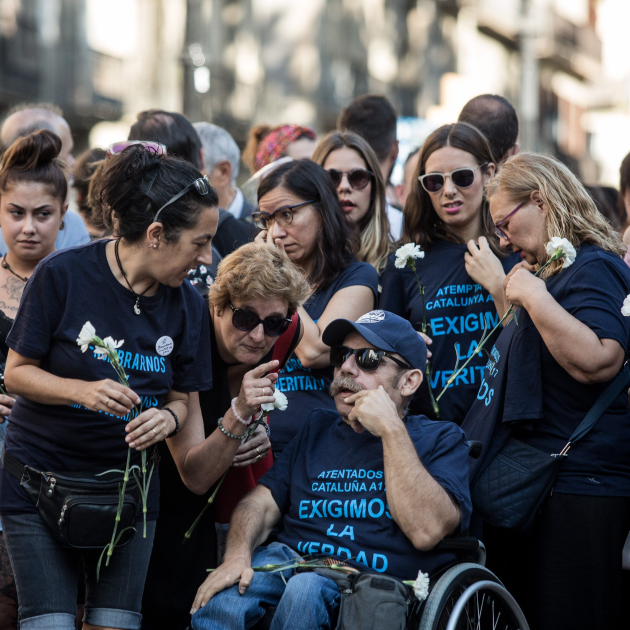No retrial, but one of the convicted men is to leave prison and be expelled from Spain. In the decision on the cassation appeals lodged by terrorists and victims over the trial for the Jihadi attacks of August 17th 2017 in Barcelona and Cambrils, the Spanish Supreme Court has dismissed all of the major claims against the sentence of the appeals chamber of the National Audience. Thus there is no change for Driss Oukabir (sentenced to 36 years in prison) or Mohamed Houli Chemlal (sentenced to 43 years) as perpetrators of the crimes of belonging to a criminal organization with a terrorist purpose, manufacture and possession of explosives for this purpose and reckless destruction and injury. Nor did the court admit the claims of family members and Mossos police officers who demanded that the trial be repeated in order to be able to accuse the surviving members of the Jihadi cell of all of the 16 murders perpetrated that day, 14 of which took place on Barcelona's Rambla.
However, the third person convicted for his role in the attacks, Said Ben Iazza, has been granted a sentence reduction which means he will leave jail immediately. The appeal of Ben Iazza, convicted as an accomplice in the crime of a criminal organization with a terrorist purpose, was partially upheld by the Supreme Court, which considers that his action "was committed through serious recklessness", because he enabled the killers to use a van, and his sentence thus is reduced from 8 years to 18 months in prison, a period which he has already served. In fact, the Spanish interior ministry wanted to expel Ben Iazza from Spain, and the National Audience blocked this because the sentence was not final. Now it is.
Doubts about collaboration
Specifically, the court, presided over by judge Manuel Marchena, partially accepts Ben Iazza's appeal, because it understands that "there are reasonable doubts that he knew or conceived in sufficient detail that, through his objectively cooperative actions, he was collaborating with a criminal organization with terrorist purposes" and affirms: "We do not identify enough evidence to allow us to conclude beyond reasonable doubt that the appellant in the end represented that, through his contribution, he would be assisting the terrorist purposes of a criminal organization. Nor do we consider it sufficiently credible that he had a clear suspicion that obliged him to actively question and that, instead of doing this, he deployed a conscious strategy of deliberate ignorance in order to evade his duties of avoidance and take advantage of them to avoid responsibility.”
For this reason, the court has reduced - and greatly - the punishment, so as to convict him "as the author of a crime of cooperation with a terrorist criminal organization due to serious recklessness, because through his behavior, making possible the use of a vehicle and his official ID document which the Ripoll terrorists then used to buy raw materials for explosive, he seriously breached the objective responsibility to care."
Right to the truth is "not damaged"
With regard to the appeals of the two other men convicted, the Supreme Court rejects the request for annulment of the trial held and "rejects damage to the right in the exercise of criminal action".In the judgment, the court states that "the purpose of the trial was configured according to the rules that discipline it and the parties were able to exercise the instruments of control of the non-inculpatory decisions stipulated in the procedural law." For the court, "there is not enough evidence to prove that the defendants could have devised or participated in the murders committed and attempted by other members of the criminal organization", who were brothers and friends radicalized by the imam of Ripoll, Abdelbaki es-Satty.
The court also rules out that the criminal procedure violated the right to the truth as claimed by some of the appellants, considering that the actions followed through the investigation and subsequent prosecution, "due to their thoroughness, extent and jurisdictional control from the very beginning, and without ambiguity, complied with the standards of protection derived from Article 2 of the European Convention on Human Rights where, by logical extension, the right invoked by the victims to the truth is located."
Es-Satty "is not alive"
And, in the face of the criterion set out by one of the appellants, the chamber rules out the conjecture that the imam es-Satty is still alive, responding to all the doubts suggested, ranging from the fact that his mobile phone was not found, the remains buried in the Spanish state and the question of whether the imam was an informer for the Spanish police. In this regard, the court explains that this accepting this thesis means that the "proven facts are discredited (...) And this is done, moreover, starting, it seems, from the idea that the trial process is an omniscient mechanism under which any shadow of doubt can only be interpreted as the product of a deliberate will towards concealment or non-investigation, although, at the same time, it is not identified by whom".
